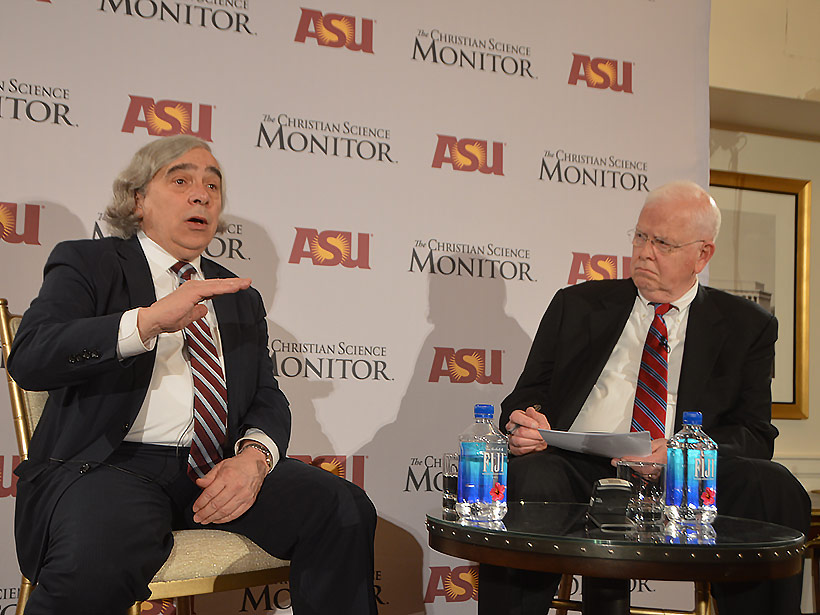With at least 165 countries planning to sign the Paris climate agreement today at the United Nations, U.S. Energy Secretary Ernest Moniz predicted that most of them will strive to meet their pledges but that cutting greenhouse gas emissions to keep within climate goals requires much more work in the United States and elsewhere.
The Paris accord, reached last December, “was a really big first step in addressing our climate challenges” over the next 10–15 years, he said at a discussion Wednesday about next steps beyond that agreement, held at the St. Regis Hotel in Washington, D. C. The agreement will come into force after at least 55 parties representing at least 55% of total global greenhouse gas emissions ratify it. Moniz called for “increasing ambition as we go further decades down the road.”
“Very deep decarbonization is going to require more arrows in our quiver, and ultimately, I believe will require a legislative economy-wide approach.”
He noted that the United States can meet its commitment to reduce greenhouse gas emissions 17% below 2005 levels by 2020. However, further reducing emissions to 26%–28% below 2005 levels by 2025 would put the country on an ambitious but difficult pace. “We do have to pick it up,” he said. “Very deep decarbonization is going to require more arrows in our quiver, and ultimately, I believe will require a legislative economy-wide approach.”
Innovation and Business Opportunities
Moniz pointed to innovation and increased manufacturing and deployment of new technologies as important ways to cut emissions and reduce clean energy costs. He cited two initiatives promoting clean energy. Mission Innovation, launched last November by 20 countries, aims to accelerate global clean energy innovation and double the countries’ clean energy investments within 5 years. The private sector Breakthrough Energy Coalition plans to turn that innovation pipeline into products.
Getting on board with climate action amounts to good business, Moniz said. “Every country in the world basically is committed to going down this path. If you don’t want to be part of that commercial future, well, companies come and go.”
Business needs a legislated economy-wide “pathway to give them rules of the road and some certainty,” he added. “People in business know how to make money when they know the rules.”
The U.S. Political Climate
“After the heat of the current very partisan divide” during the presidential election, “we will continue to see solutions that drive us towards a low carbon economy.”
Moniz anticipates action on climate continuing, no matter who wins the U.S. presidential election in November because “Mother Nature will continue to speak to all of us” and because public opinion will continue to move “in the direction of understanding that we do need a response” to climate change.
“After the heat of the current very partisan divide” during the presidential election, “we will continue to see solutions that drive us towards a low carbon economy,” he said.
—Randy Showstack, Staff Writer
Citation: Showstack, R. (2016), U.S. energy secretary says Paris accord cuts are not enough, Eos, 97, doi:10.1029/2016EO051121. Published on 22 April 2016.
Text © 2016. The authors. CC BY-NC-ND 3.0
Except where otherwise noted, images are subject to copyright. Any reuse without express permission from the copyright owner is prohibited.

